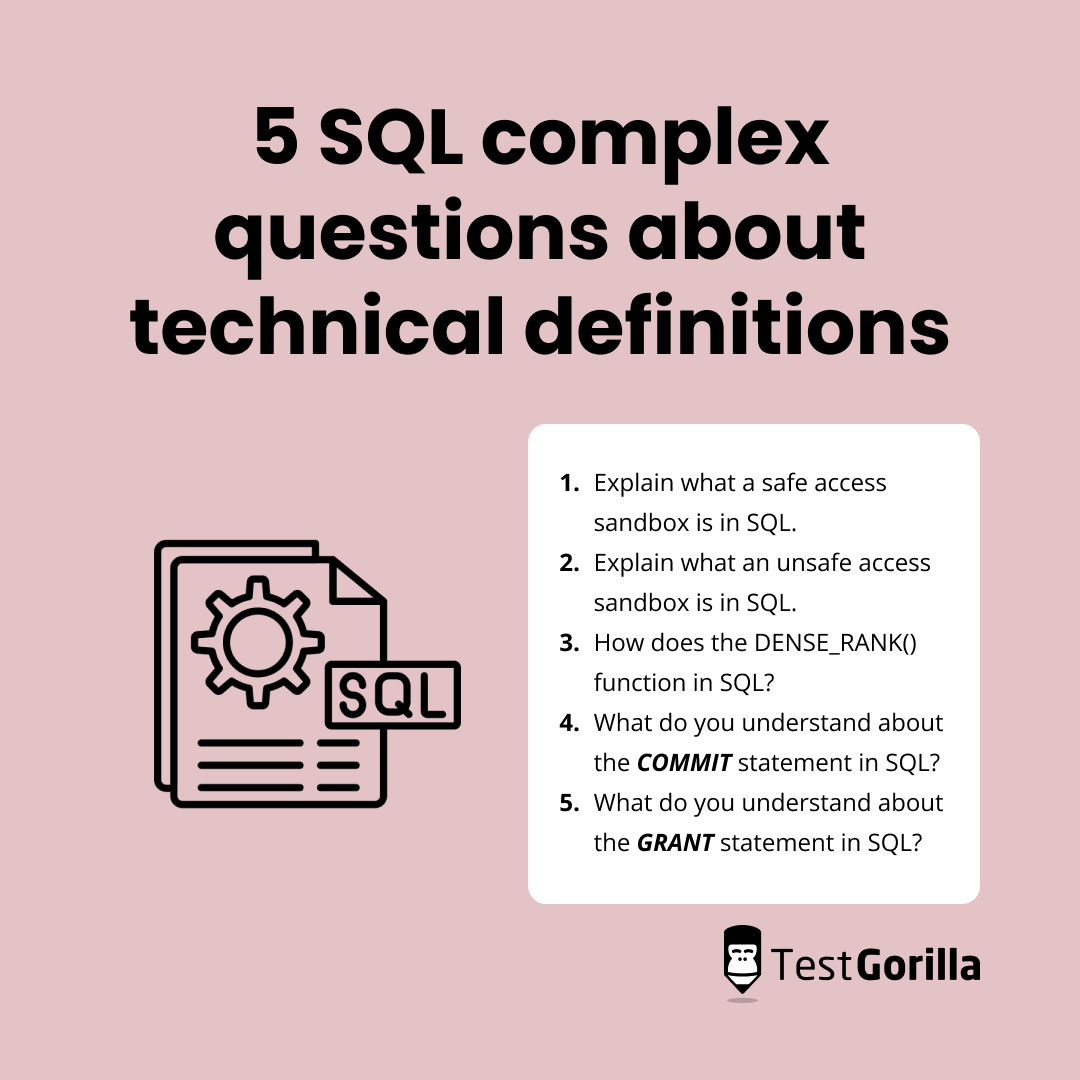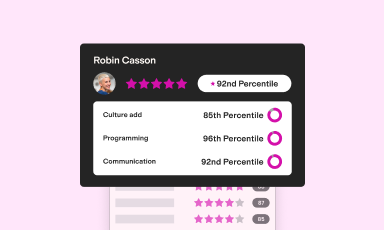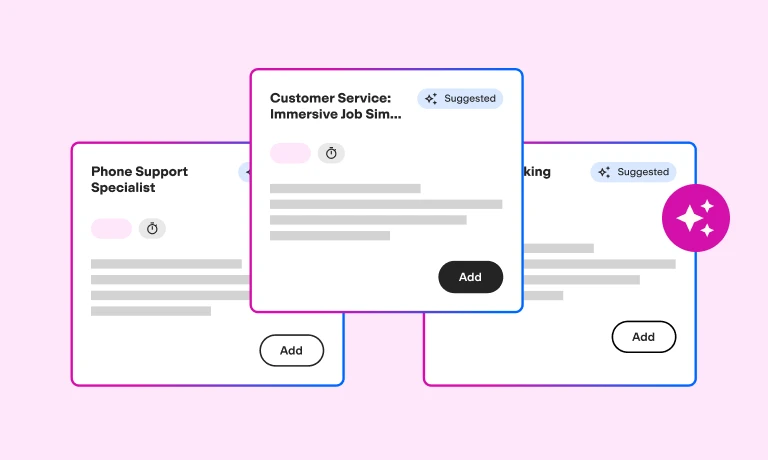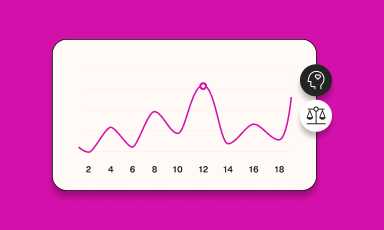30 complex SQL interview questions to ask programmers
Does your organization need to find an advanced SQL database engineer to complete challenging projects? If you’re a recruiter looking for suitable talent, finding the perfect candidate can be a real challenge. A key part of the process is discovering applicants’ knowledge, traits, experience, and technical SQL skills.
Asking candidates to complete a SQLite coding skills test as part of an assessment will show you who has the best technical SQL skills. This will give you a pool of potential candidates to invite to interviews, enabling you to evaluate their experience, knowledge, and traits even more.
Once candidates have completed a skills assessment, the next step is to conduct interviews to learn more about the applicants in your shortlist.
It can be challenging to find high-quality interview questions. Fortunately, we’ve prepared a list of 30 complex SQL interview questions below for you to ask candidates during an interview.
Table of contents
- 10 general and skill-related complex SQL interview questions
- 5 sample answers to general and skill-related complex SQL interview questions
- 10 complex SQL interview questions about technical definitions
- 5 sample answers to complex SQL interview questions about technical definitions
- 10 complex SQL interview questions about methods and processes
- 5 sample answers to complex SQL interview questions about methods and processes
- How should you use the SQLite coding skills test with complex SQL interview questions?
- Assess database engineers with complex SQL interview questions and skills tests
10 general and skill-related complex SQL interview questions
Ask your candidates some of these general, technical, and soft skill-related complex SQL interview questions to assess their knowledge and skills during the interview.
1. Please name three differences between PL/SQL and SQL.
2. Name four advantages of PL/SQL functions.
3. List three factors that affect a database’s functionality.
4. Can you name three factors that typically affect a query’s performance?
5. Please define nested triggers.
6. Name two of your best SQL skills. How have they helped you complete projects?
7. Name one soft skill that helps you complete your SQL projects.
8. Please describe one benefit of attention to detail for SQL projects.
9. Can you explain why collaboration is fundamental as a SQL project team member?
10. Please explain how your communication skills help you discuss technical topics with non-technical stakeholders.
5 sample answers to general and skill-related complex SQL interview questions
Check the sample answers to these five general and skill-related complex SQL interview questions to review the accuracy of your candidates’ responses.
1. Name two of your best SQL skills. How have they helped you complete projects?
Many SQL abilities can help engineers complete their projects, from technical to soft skills. These could include skills in debugging, communication, time management, big data, querying, and normalization.
You can expect each interviewee to mention at least two unique skills they have honed and explain why they’re useful. Asking this question is crucial to ensure candidates are qualified for your role.
Some candidates may discuss their database management skills and systems knowledge and describe how they help them efficiently supply data to applications. This is important for developing data-intensive applications.
Others might talk about their knowledge of applications like SQL Server Management Studio and explain how this skill helps them design and manage databases.
Ask candidates about how these skills helped them complete projects successfully. You can also use our SQL Server Management Studio and Database Management and Administration skills tests to evaluate these vital database-related skills.
2. Name one soft skill that helps you complete your SQL projects.
Candidates may each mention a different soft skill, such as critical thinking, decision-making, or interpersonal skills, that helps them complete SQL projects and collaborate with others to achieve application development goals.
When listening to candidates’ responses, consider whether they have soft skills matching your job description and the role’s requirements.
A few other soft skills that help database engineers complete SQL projects include:
Communication skills
Problem-solving skills
Time management skills
Your best candidates will understand why these skills are important and explain how they use them in the workplace.
For example, they might explain that SQL developers use written and verbal communication skills to explain technical concepts to non-technical team members. These must-have skills help with problem identification by enabling them to approach application development issues from multiple perspectives.
Since communication and soft skills are critical for engineers, use a Communication, Problem Solving, or Time Management skills test to evaluate them.
3. List three factors that affect a database’s functionality.
Despite their usefulness, databases are not immune to errors and can have issues due to different factors. Candidates with SQL database experience will be able to give a few examples of these potential issues, including:
Resource issues
Performance issues caused by a high workload
Contention
Check if your candidates can explain how these factors impact a database. For example, the database’s performance can degrade if developers don’t properly allocate resources such as the kernel, cache controllers, and memory.
4. Can you name three factors that typically affect a query’s performance?
Many factors can affect a query’s performance, and expert candidates should have no issues responding with three examples. A few factors they may mention include:
Query structures
Database size
Number of nodes or processors
Query structures that need to access significant amounts of data can make an application run slowly, and large database sizes can increase the time the application takes to read data. Being aware of these issues can help developers correct these problems to ensure the app runs efficiently.
You should dig deeper into your candidates’ knowledge to see if they can explain how these factors affect the performance of a query. In response, they may mention that databases with millions of rows can negatively impact a query’s performance.
5. Please describe one benefit of attention to detail for SQL projects.
Small coding mistakes can cause code to work in an unexpected way. Therefore, SQL engineers must pay attention to minor details to catch issues like bugs, data structure issues, unoptimized database queries, and inefficient algorithms.
In the context of SQL projects, attention to detail involves finding and eliminating any mistakes in the code so that the database runs correctly and efficiently.
This skill also facilitates the system documentation process by helping SQL engineers ensure all the information is accurate and ready for developers to use when modifying, using, and maintaining software.
Attention to detail can enhance the quality of your candidates’ work and is recommended by the US Bureau of Labor Statistics, which explains that SQL developers should be detail-oriented.
Therefore, it’s a good idea to include an Attention to Detail skills test in your skills assessment to evaluate your candidates’ meticulousness and ability to focus on small errors in their code.
The best insights on HR and recruitment, delivered to your inbox.
Biweekly updates. No spam. Unsubscribe any time.
10 complex SQL interview questions about technical definitions
Ask your interviewees some of these complex SQL interview questions about technical definitions to evaluate their expertise and experience.
1. What does the DROP statement do in SQL?
2. What does the TRUNCATE statement do in SQL?
3. Can you explain what the RANK() function does in SQL?
4. Please tell us what the DENSE_RANK() function does in SQL.
5. What do you understand about the COMMIT statement in SQL?
6. What do you understand about the GRANT statement in SQL?
7. Can you explain what ETL means in SQL?
8. Could you explain what a safe access sandbox is in SQL?
9. Could you explain what an unsafe access sandbox is in SQL?
10. Can you tell us what an external access sandbox is in SQL?
5 sample answers to complex SQL interview questions about technical definitions
Refer to the following five sample answers to these complex SQL interview questions about technical definitions to assess your candidates’ responses and knowledge.
1. Could you explain what a safe access sandbox is in SQL?
This technical SQL interview question will help you learn about your candidates’ data security knowledge.
Skilled candidates should know that a safe access sandbox enables engineers to access or modify a database with certain restrictions that ensure security. This can protect the database against SQL injection attacks and make sure the developer only executes valid statements.
Even though safe functions like parameterized queries can also help engineers use databases safely, it’s important to have safe access sandbox knowledge to minimize the risk of security breaches. Safe access sandboxes also enable developers to perform tests without affecting the production environment.
Engineers can also create and store functions and triggers with a safe access sandbox, which is vital for improving application performance, reducing redundant code, and simplifying complex operations. However, they cannot create files or access memory. Despite this, sandboxes clearly have several advantages.
The best responses will explain how safe access sandboxes differ from unsafe access sandboxes. They may also compare the two in terms of data security.
2. Could you explain what an unsafe access sandbox is in SQL?
Unsafe access sandboxes do not enforce security restrictions, meaning users can execute untrusted code and access threads and memory management.
Engineers can quickly test software or prototype new features with unsafe access sandboxes. However, if they want to prevent unauthorized sensitive data access, they require security measures.
Security breaches can be costly, amounting to an average of $9.4m in the US in 2022. It’s crucial to avoid the expenses that result from such breaches.
Therefore, the best candidates will save your company money if they understand that unsafe access sandboxes are not the best option to protect data and that it’s wise to select safe sandboxes.
3. Please tell us what the DENSE_RANK() function does in SQL.
DENSE_RANK() is a function that ranks database data according to the conditions an engineer specifies. Unlike the RANK() function, DENSE_RANK() does not skip any positions even when it notices there are two equal values. Instead, two equal values will have an equal rank.
Candidates should also know that DENSE_RANK() returns continuous numbering in the ranking process, assigning a rank value to each row in the database. This function is particularly useful for SQL projects in which engineers must identify the highest or lowest value after they group the data by rank.
For instance, in a retail database, if an engineer wants to find which shopper spent the highest amount, they can use the DENSE_RANK() function to find the highest value in the table.
Therefore, it’s important to ask follow-up questions to ensure that your candidates have used this function in projects. Don’t be afraid to ask candidates if they know that DENSE_RANK() is an efficient function that can help developers with specific projects like those involving financial analysis or customer segmentation.
4. What do you understand about the COMMIT statement in SQL?
The COMMIT statement enables SQL database engineers to save changes they make in a transaction, ensuring that they are permanently stored in the database. Therefore, these changes persist even in the event of a crash or failure.
Without the COMMIT statement, the changes made within the transaction would be rolled back, effectively undoing the modifications.
Engineers cannot retrieve the previous values when they complete this process unless they use a specific command.
The best candidates will give an example of the syntax used to complete this operation, such as the following:
BEGIN TRANSACTION;
UPDATE Employees
SET incentive = 2000
WHERE department = ‘Sales’;
COMMIT;
If they know that this syntax enables them to save the changes to the data, they may be a good match for your role. You can further test their knowledge by asking if they know the ROLLBACK command reverts all changes within the current transaction.
5. What do you understand about the GRANT statement in SQL?
Experts with advanced SQL knowledge should understand that the GRANT statement gives permissions to users, enabling them to perform specific operations on database tables.
One example of the GRANT statement in action could be if an engineer wants to provide access to another user to update a table in SQL. In this case, the engineer would use this statement:
GRANT UPDATE ON SQL_table_name TO name_of_user WITH GRANT OPTION;
Candidates who know that it is possible to grant permissions to other users to perform particular actions are worth considering for your team.
10 complex SQL interview questions about methods and processes
Ask your candidates some of these 10 complex SQL interview questions about methods and processes to check their proficiency in completing database-related operations.
1. Do you have a method to mitigate duplicate keys in SQL?
2. Which method would you use to insert several rows in a SQL database table?
3. Please explain how to select every even-numbered record in a table.
4. Please tell us how to select every odd-numbered record in a table.
5. Explain how you would create a replica of a table.
6. Please tell us how you would count rows in a table without the COUNT() function.
7. Can you explain how you would improve a server’s performance?
8. Please tell us how to show a student table’s maximum and minimum marks.
9. Could you explain how to display the date in the DD-MM-YYYY format?
10. Can you describe how you would retrieve the number of weekends in the current month?
5 sample answers to complex SQL interview questions about methods and processes
Here are five sample answers to the important complex SQL interview questions about methods and processes to evaluate your candidates’ responses quickly after the interviews are finished.
1. Which method would you use to insert several rows in a SQL database table?
Responses to this complex SQL interview question will show if your candidates understand how to facilitate complex processes required to complete projects such as e-commerce data manipulation, financial recording, and reporting sales.
The best candidates should understand that the INSERT INTO statement enables SQL database engineers to insert multiple rows in a SQL database table.
Look for candidates who can provide the following syntax to complete this method:
INSERT INTO name_of_table (column1, column2, column3, …)
VALUES (value1, value2, value3, …);
Then check if they know how to select the data they want to insert by using the following syntax:
SELECT * FROM name_of_table;
With these statements, candidates can quickly insert data into a financial or sales table, typically by accessing the data from another table. Therefore, it’s worth checking your candidates’ knowledge in this area to ensure you hire one who can use INSERT INTO and SELECT.
2. Please tell us how you would count rows in a table without the COUNT() function.
Although SQL database engineers might use the COUNT() function to retrieve the number of rows that match their specified criteria, other methods exist to achieve this goal.
Candidates with comprehensive SQL knowledge should know that they can use the following syntax to count the rows in a table:
SELECT name_of_table, num_rows from user_tables WHERE name_of_table=‘Specific_Name’;
3. Please explain how to select every even-numbered record in a table.
This technical SQL interview question will test your candidates’ knowledge of SQL statements. Candidates should know that the following statement retrieves all even-numbered records from the database table:
SELECT * from table WHERE ID % 2 = 0;
Your candidates should know this method works because the syntax leaves a zero remainder after dividing the column value by two. Since the returned zero value is even, the syntax only returns records with even-numbered IDs.
4. Can you explain how you would improve a server’s performance?
One simple way to improve a server’s performance is to keep SQL transactions short and minimize lock escalation footprints in queries. This works by reducing the number of locks it maintains and freeing up memory that would otherwise go to lock maintenance.
Candidates may name a few other examples of ways to improve the server’s performance, such as the following:
Confirm that the server can handle the required workload with soak testing
Use the latest SQL server and operating system versions
Assign the optimal data types by checking attributes for each record
Remember that our Microsoft SQL Server skills test will help you hire software developer professionals with server expertise and experience in SQL development.
5. Could you explain how to display the date in the DD-MM-YYYY format?
If you want to thoroughly test your candidates’ SQL knowledge, ask them this interview question.
Using this format could be important for many SQL projects, such as manipulating financial records, completing database upgrades using dates for healthcare, manufacturing databases, or sales reporting. For this reason, candidates should be familiar with the syntax required for this case.
When responding, your candidates should write down the syntax they would use to display the date in the database table in the format you request.
Below is an example of the syntax they should use:
SELECT to_date (Onboard_date, ‘DD-MM-YYYY’) Date_format from Candidate;
How should you use the SQLite coding skills test with complex SQL interview questions?
At TestGorilla, we recommend using the SQLite coding skills tests before asking candidates any complex SQL interview questions. By giving candidates assessments first, you can discover a few discussion points based on their best skills. This can help form the basis of a useful, productive interview.
You can also quickly select the top-performing applicants, choose between two highly skilled candidates, and reduce your time-to-hire metrics. The skills assessment market is projected to reach $5.6bn by 2030 – employers around the globe are already using this method to find the best professionals.
To use our SQLite coding skills test, remember that you can choose four other tests to include in a comprehensive assessment. You can select soft skills or other SQL-related tests to assess your candidates and then check their scores to see which ones are the most proficient.
Assess database engineers with complex SQL interview questions and skills tests
With this article’s complex SQL interview questions, you’re ready to conduct interviews with the best talent in your candidate pool. But which skills-testing platform should you choose to assess candidates after sourcing?
TestGorilla has helped 9,000 companies find experts for their teams. Our skills tests are reviewed by industry experts and produce reliable results.
See how our platform works in a free demo, and check out the tests in our test library to start your journey toward a flawless hiring process.
Hire database engineers with complex SQL interview questions and TestGorilla’s comprehensive skills tests.
You've scrolled this far
Why not try TestGorilla for free, and see what happens when you put skills first.



















